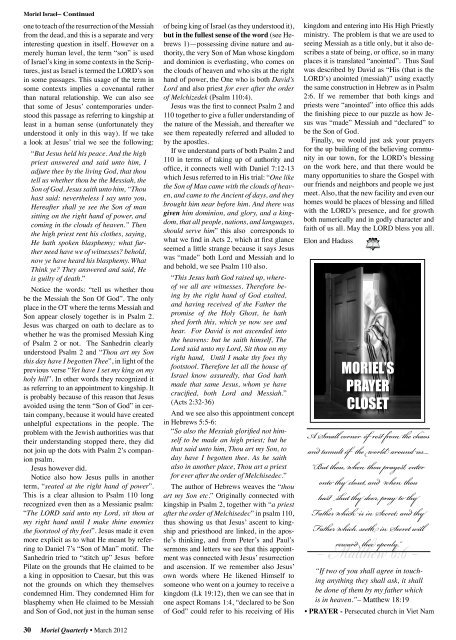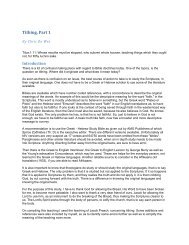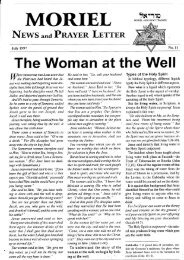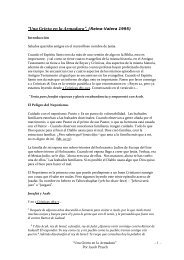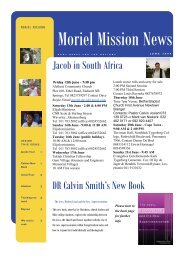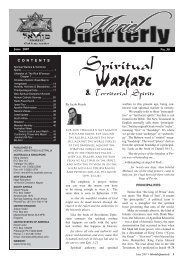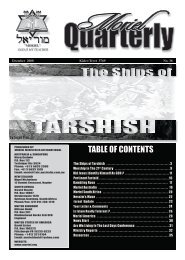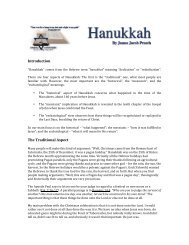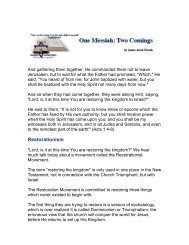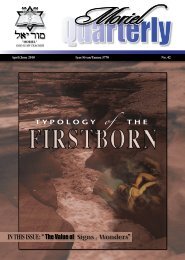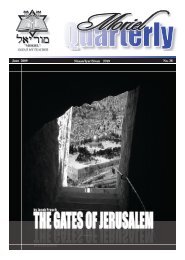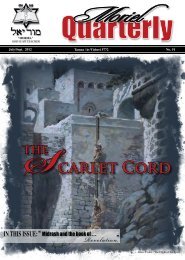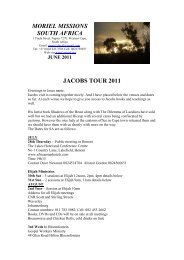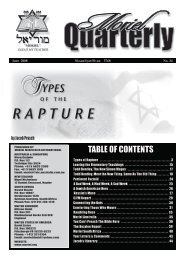The Legacy of Jacob - Moriel Ministries
The Legacy of Jacob - Moriel Ministries
The Legacy of Jacob - Moriel Ministries
Create successful ePaper yourself
Turn your PDF publications into a flip-book with our unique Google optimized e-Paper software.
<strong>Moriel</strong> Israel– Continued<br />
one to teach <strong>of</strong> the resurrection <strong>of</strong> the Messiah<br />
from the dead, and this is a separate and very<br />
interesting question in itself. However on a<br />
merely human level, the term “son” is used<br />
<strong>of</strong> Israel’s king in some contexts in the Scriptures,<br />
just as Israel is termed the LORD’s son<br />
in some passages. This usage <strong>of</strong> the term in<br />
some contexts implies a covenantal rather<br />
than natural relationship. We can also see<br />
that some <strong>of</strong> Jesus’ contemporaries understood<br />
this passage as referring to kingship at<br />
least in a human sense (unfortunately they<br />
understood it only in this way). If we take<br />
a look at Jesus’ trial we see the following:<br />
“But Jesus held his peace. And the high<br />
priest answered and said unto him, I<br />
adjure thee by the living God, that thou<br />
tell us whether thou be the Messiah, the<br />
Son <strong>of</strong> God. Jesus saith unto him, “Thou<br />
hast said: nevertheless I say unto you,<br />
Hereafter shall ye see the Son <strong>of</strong> man<br />
sitting on the right hand <strong>of</strong> power, and<br />
coming in the clouds <strong>of</strong> heaven.” <strong>The</strong>n<br />
the high priest rent his clothes, saying,<br />
He hath spoken blasphemy; what further<br />
need have we <strong>of</strong> witnesses behold,<br />
now ye have heard his blasphemy. What<br />
Think ye <strong>The</strong>y answered and said, He<br />
is guilty <strong>of</strong> death.”<br />
Notice the words: “tell us whether thou<br />
be the Messiah the Son Of God”. <strong>The</strong> only<br />
place in the OT where the terms Messiah and<br />
Son appear closely together is in Psalm 2.<br />
Jesus was charged on oath to declare as to<br />
whether he was the promised Messiah King<br />
<strong>of</strong> Psalm 2 or not. <strong>The</strong> Sanhedrin clearly<br />
understood Psalm 2 and “Thou art my Son<br />
this day have I begotten <strong>The</strong>e”, in light <strong>of</strong> the<br />
previous verse “Yet have I set my king on my<br />
holy hill”. In other words they recognized it<br />
as referring to an appointment to kingship. It<br />
is probably because <strong>of</strong> this reason that Jesus<br />
avoided using the term “Son <strong>of</strong> God” in certain<br />
company, because it would have created<br />
unhelpful expectations in the people. <strong>The</strong><br />
problem with the Jewish authorities was that<br />
their understanding stopped there, they did<br />
not join up the dots with Psalm 2’s companion<br />
psalm.<br />
Jesus however did.<br />
Notice also how Jesus pulls in another<br />
term, “seated at the right hand <strong>of</strong> power”.<br />
This is a clear allusion to Psalm 110 long<br />
recognized even then as a Messianic psalm:<br />
“<strong>The</strong> LORD said unto my Lord, sit thou at<br />
my right hand until I make thine enemies<br />
the footstool <strong>of</strong> thy feet”. Jesus made it even<br />
more explicit as to what He meant by referring<br />
to Daniel 7’s “Son <strong>of</strong> Man” motif. <strong>The</strong><br />
Sanhedrin tried to “stitch up” Jesus before<br />
Pilate on the grounds that He claimed to be<br />
a king in opposition to Caesar, but this was<br />
not the grounds on which they themselves<br />
condemned Him. <strong>The</strong>y condemned Him for<br />
blasphemy when He claimed to be Messiah<br />
and Son <strong>of</strong> God, not just in the human sense<br />
<strong>of</strong> being king <strong>of</strong> Israel (as they understood it),<br />
but in the fullest sense <strong>of</strong> the word (see Hebrews<br />
1)—possessing divine nature and authority,<br />
the very Son <strong>of</strong> Man whose kingdom<br />
and dominion is everlasting, who comes on<br />
the clouds <strong>of</strong> heaven and who sits at the right<br />
hand <strong>of</strong> power, the One who is both David’s<br />
Lord and also priest for ever after the order<br />
<strong>of</strong> Melchizedek (Psalm 110:4).<br />
Jesus was the first to connect Psalm 2 and<br />
110 together to give a fuller understanding <strong>of</strong><br />
the nature <strong>of</strong> the Messiah, and thereafter we<br />
see them repeatedly referred and alluded to<br />
by the apostles.<br />
If we understand parts <strong>of</strong> both Psalm 2 and<br />
110 in terms <strong>of</strong> taking up <strong>of</strong> authority and<br />
<strong>of</strong>fice, it connects well with Daniel 7:12-13<br />
which Jesus referred to in His trial: “One like<br />
the Son <strong>of</strong> Man came with the clouds <strong>of</strong> heaven,<br />
and came to the Ancient <strong>of</strong> days, and they<br />
brought him near before him. And there was<br />
given him dominion, and glory, and a kingdom,<br />
that all people, nations, and languages,<br />
should serve him” this also corresponds to<br />
what we find in Acts 2, which at first glance<br />
seemed a little strange because it says Jesus<br />
was “made” both Lord and Messiah and lo<br />
and behold, we see Psalm 110 also.<br />
“This Jesus hath God raised up, where<strong>of</strong><br />
we all are witnesses. <strong>The</strong>refore being<br />
by the right hand <strong>of</strong> God exalted,<br />
and having received <strong>of</strong> the Father the<br />
promise <strong>of</strong> the Holy Ghost, he hath<br />
shed forth this, which ye now see and<br />
hear. For David is not ascended into<br />
the heavens: but he saith himself, <strong>The</strong><br />
Lord said unto my Lord, Sit thou on my<br />
right hand, Until I make thy foes thy<br />
footstool. <strong>The</strong>refore let all the house <strong>of</strong><br />
Israel know assuredly, that God hath<br />
made that same Jesus, whom ye have<br />
crucified, both Lord and Messiah.”<br />
(Acts 2:32-36)<br />
And we see also this appointment concept<br />
in Hebrews 5:5-6:<br />
“So also the Messiah glorified not himself<br />
to be made an high priest; but he<br />
that said unto him, Thou art my Son, to<br />
day have I begotten thee. As he saith<br />
also in another place, Thou art a priest<br />
for ever after the order <strong>of</strong> Melchisedec.”<br />
<strong>The</strong> author <strong>of</strong> Hebrews weaves the “thou<br />
art my Son etc.” Originally connected with<br />
kingship in Psalm 2, together with “a priest<br />
after the order <strong>of</strong> Melchisedec” in psalm 110,<br />
thus showing us that Jesus’ ascent to kingship<br />
and priesthood are linked, in the apostle’s<br />
thinking, and from Peter’s and Paul’s<br />
sermons and letters we see that this appointment<br />
was connected with Jesus’ resurrection<br />
and ascension. If we remember also Jesus’<br />
own words where He likened Himself to<br />
someone who went on a journey to receive a<br />
kingdom (Lk 19:12), then we can see that in<br />
one aspect Romans 1:4, “declared to be Son<br />
<strong>of</strong> God” could refer to his receiving <strong>of</strong> His<br />
kingdom and entering into His High Priestly<br />
ministry. <strong>The</strong> problem is that we are used to<br />
seeing Messiah as a title only, but it also describes<br />
a state <strong>of</strong> being, or <strong>of</strong>fice, so in many<br />
places it is translated “anointed”. Thus Saul<br />
was described by David as “His (that is the<br />
LORD’s) anointed (messiah)” using exactly<br />
the same construction in Hebrew as in Psalm<br />
2:6. If we remember that both kings and<br />
priests were “anointed” into <strong>of</strong>fice this adds<br />
the finishing piece to our puzzle as how Jesus<br />
was “made” Messiah and “declared” to<br />
be the Son <strong>of</strong> God.<br />
Finally, we would just ask your prayers<br />
for the up building <strong>of</strong> the believing community<br />
in our town, for the LORD’s blessing<br />
on the work here, and that there would be<br />
many opportunities to share the Gospel with<br />
our friends and neighbors and people we just<br />
meet. Also, that the new facility and even our<br />
homes would be places <strong>of</strong> blessing and filled<br />
with the LORD’s presence, and for growth<br />
both numerically and in godly character and<br />
faith <strong>of</strong> us all. May the LORD bless you all.<br />
Elon and Hadass<br />
moriel’s<br />
prayer<br />
closet<br />
A Small corner <strong>of</strong> rest from the chaos<br />
and tumult <strong>of</strong> the world around us....<br />
“But thou, when thou prayest, enter<br />
onto thy closet, and when thou<br />
hast shut thy door, pray to thy<br />
Father which is in Secret; and thy<br />
Father which seeth in Secret will<br />
reward thee openly.”<br />
– Matthew 6:6 –<br />
“If two <strong>of</strong> you shall agree in touching<br />
anything they shall ask, it shall<br />
be done <strong>of</strong> them by my father which<br />
is in heaven.”– Matthew 18:19<br />
• Prayer - Persecuted church in Viet Nam<br />
30 <strong>Moriel</strong> Quarterly • March 2012


